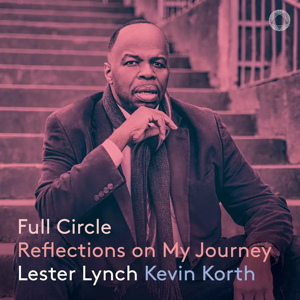
Full Circle: Reflections on my Journey
Modest Mussorgsky (1839-1881)
Pesni i Pljaski Smerti (Songs and Dances of Death)
Johannes Brahms (1833-1897)
Vier Ernste Gesänge (Four Serious Songs)
Franz Schubert (1797-1828)
Schwanengesang (Swan Song)– selections
Lester Lynch (baritone), Kevin Korth (piano)
rec. 2023/2024, The Scoring Stage, Skywalker Sound, Marin County, USA
Sung texts with English translations enclosed
Reviewed as download
Pentatone PTC5187220D [64]
American baritone Lester Lynch has appeared in a number of complete opera recordings on the Pentatone label over the last few years, and I have never been attracted by his actual tone but invariably appreciated his dramatic intensity and deep probing theatrical instinct. Others have been more positive and the fault is probably mine, but I can only express my personal experience. Here in a quite different genre, the art song, I get an opportunity to revise my opinion.
In his foreword to this album, Lester Lynch writes candidly about his life: “In the depths of life’s struggles, amidst a backdrop of racism, sickness and hatred, music emerged as my guiding light and constant companion. Bach, Brahms, Beethoven, Verdi, Mussorgsky, Chopin, Rachmaninoff and Schubert became not just composers, but guardians of my soul. Their melodies provided solace when the world seemed bleak, strength when faced with adversity, and love when surrounded by hate and despair.” It may come as a surprise to see his choice of repertoire. This is not music that conveys light and solace but rather increases the burden, but I believe it is his way of penetrating the darkness of his experiences. The songs here are permeated with darkness and only occasionally is there a glimpse of light.
Mussorgsky’s Songs and Dances of Death is possibly the composer’s most valuable work, and is a very realistic description of death in various guises, from the touching Lullaby, where a mother rocks her sick child, until she understands that he is doomed to die and leaves him to Death, who rocks him to the eternal rest. There is such warmth and deep involvement in Lynch’s singing, which touches the heart in a way that few recorded readings of this oft-recorded have managed to convey. The same is true for the remaining three songs: the Serenade for the dying girl, which becomes a creepy love duet, followed by the drunken peasant who stumbles in the snow and freezes to death, while Death sings a lullaby, and finally Death in disguise as Field Marshal, in the aftermath of a bloody war. Lynch is masterly all through this chilly cycle.
Brahms’ Vier ernste Gesänge, composed as a sequel to Ein Deutsches Requiem thirty years later, was written to his friend Clara Schumann, who had suffered a stroke in 1896, and as in the Requiem, he employed texts from Luther’s German bible. The first three songs are taken from the Old Testament and deal with death, while the fourth is from the New Testament and focuses on faith, hope and charity. Again, Lester Lynch is deeply involved and filled with sorrow and also wrath. Ich wandte mich is sensitive, very sensitive, O Tod, wie bitter bist du digs deep into the human soul, and the second stanza is like an open wound. In the last stanza of Wenn ich mit Menschen und mit Engelsungen redete there is some light creeping in, and Lynch lightens the tone accordingly. It is a very sensitive reading.
Schwanengesang is the collective title for some of the last songs Schubert leftbehind, and the title is not Schubert’s own but the editor’s. Illness darkened Schubert’s last few months and darkness also reigns in many of these songs. The eight songs that Lynch has chosen also belong to the darkest, even though Liebesbotschaft and Die Taubenpost are fairly light in tone. His texting isexemplary throughout – concerning his Russian I am not a reliable judge – and Kevin Korth once again proves his versatility as an accompanist. This is a dark and heavy programme, but it is worth the effort to give it a chance – although maybe not in one sitting.
Göran Forsling
Buying this recording via the link below generates revenue for MWI, which helps the site remain free.


















